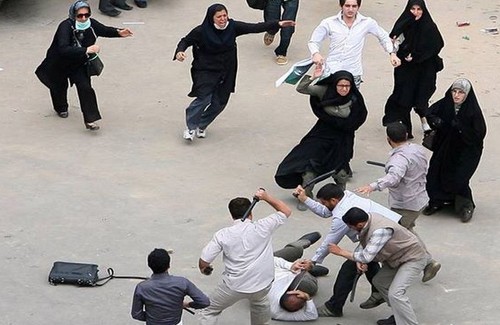U.S. Slaps Sanctions On Iranian Intelligence Ministry
13:00 - 18 February 2012

KURDPA - The U.S. Treasury Department has slapped sanctions on Iran\'s main intelligence organization, accusing it of supporting terrorist groups, committing human rights abuses, and backing the Syrian government\'s lethal crackdown on its citizens.
The new measures prohibit U.S. citizens from engaging in any transactions with the Iranian Ministry of Intelligence and Security and block any property interests that the ministry has in the United States. All members of the organization are also barred from travel to the United States.
U.S. Undersecretary for Terrorism and Financial Intelligence David Cohen said in a statement on February 16 that the ministry supports \"terrorist groups including Al-Qaeda, Al-Qaeda in Iraq, Hizballah, and Hamas -- again exposing the extent of Iran’s sponsorship of terrorism as a matter of Iranian state policy.”
The statement said the ministry had coordinated \"the movement of Al-Qaeda operatives in Iran and provided them with documents, identification cards, and passports.\"
It accuses the ministry of funneling money and weapons to Al-Qaeda\'s Iraqi branch and of negotiating the release of terrorist operatives.
Cohen also said the ministry \"exports its vicious practices\" to Iranian ally Syria, supporting the brutal government crackdown against the opposition that has reportedly left more than 6,000 dead.
Latest In List Of Punitive Measures
The Treasury statement also cites the Iranian ministry\'s general use of \"abhorrent methods of interrogation, such as mock executions and forms of sexual violence,\" and its targeting of members of the Baha\'i faith.
The sanctions are the latest in a growing list of punitive measures enacted by the United States over Iran\'s terrorist activities and rights transgressions.
They came on a day when administration officials and members of Congress also addressed the threat posed by Iran\'s controversial nuclear program, which the West says is aimed at achieving nuclear weapons capability.
Iran has refused to suspend its uranium-enrichment program and insists it has peaceful intentions.
On February 16, a bipartisan group of senators announced a bill that would urge President Barack Obama to \"reaffirm the unacceptability of an Iran with nuclear weapons capability and oppose any policy that would rely on containment as an option in response to the Iranian nuclear threat.\"
The legislation says the Senate is united in its opposition to such a policy.
Iranian Nuke \'Not Likely\'
The bill is being seen by analysts as an attempt to convince the White House that it should consider a military response to the nuclear standoff.
The bill\'s sponsors included the former vice presidential candidate and current independent senator for Connecticut, Joseph Lieberman.
\"Whatever the consequences of a military strike to disable the Iranian nuclear program, the consequences of living with a nuclear Iran are much more grave and threatening to the security of every American,\" he told reporters.
Earlier on February 16, U.S. Director of National Intelligence James Clapper told the Senate Armed Services Committee that it was \"technically feasible\" that Iran could produce a nuclear weapon in one or two years if its leaders decided to, \"but practically not likely.\"
Testifying alongside Clapper, U.S. Defense Intelligence Agency chief Ronald Burgess said Iran was \"unlikely to initiate or intentionally provoke a conflict,\" but could respond to a strike against its nuclear program by closing the Strait of Hormuz and launch missiles at regional U.S. forces and allies.
Source - RFE/RL
The new measures prohibit U.S. citizens from engaging in any transactions with the Iranian Ministry of Intelligence and Security and block any property interests that the ministry has in the United States. All members of the organization are also barred from travel to the United States.
U.S. Undersecretary for Terrorism and Financial Intelligence David Cohen said in a statement on February 16 that the ministry supports \"terrorist groups including Al-Qaeda, Al-Qaeda in Iraq, Hizballah, and Hamas -- again exposing the extent of Iran’s sponsorship of terrorism as a matter of Iranian state policy.”
The statement said the ministry had coordinated \"the movement of Al-Qaeda operatives in Iran and provided them with documents, identification cards, and passports.\"
It accuses the ministry of funneling money and weapons to Al-Qaeda\'s Iraqi branch and of negotiating the release of terrorist operatives.
Cohen also said the ministry \"exports its vicious practices\" to Iranian ally Syria, supporting the brutal government crackdown against the opposition that has reportedly left more than 6,000 dead.
Latest In List Of Punitive Measures
The Treasury statement also cites the Iranian ministry\'s general use of \"abhorrent methods of interrogation, such as mock executions and forms of sexual violence,\" and its targeting of members of the Baha\'i faith.
The sanctions are the latest in a growing list of punitive measures enacted by the United States over Iran\'s terrorist activities and rights transgressions.
They came on a day when administration officials and members of Congress also addressed the threat posed by Iran\'s controversial nuclear program, which the West says is aimed at achieving nuclear weapons capability.
Iran has refused to suspend its uranium-enrichment program and insists it has peaceful intentions.
On February 16, a bipartisan group of senators announced a bill that would urge President Barack Obama to \"reaffirm the unacceptability of an Iran with nuclear weapons capability and oppose any policy that would rely on containment as an option in response to the Iranian nuclear threat.\"
The legislation says the Senate is united in its opposition to such a policy.
Iranian Nuke \'Not Likely\'
The bill is being seen by analysts as an attempt to convince the White House that it should consider a military response to the nuclear standoff.
The bill\'s sponsors included the former vice presidential candidate and current independent senator for Connecticut, Joseph Lieberman.
\"Whatever the consequences of a military strike to disable the Iranian nuclear program, the consequences of living with a nuclear Iran are much more grave and threatening to the security of every American,\" he told reporters.
Earlier on February 16, U.S. Director of National Intelligence James Clapper told the Senate Armed Services Committee that it was \"technically feasible\" that Iran could produce a nuclear weapon in one or two years if its leaders decided to, \"but practically not likely.\"
Testifying alongside Clapper, U.S. Defense Intelligence Agency chief Ronald Burgess said Iran was \"unlikely to initiate or intentionally provoke a conflict,\" but could respond to a strike against its nuclear program by closing the Strait of Hormuz and launch missiles at regional U.S. forces and allies.
Source - RFE/RL



